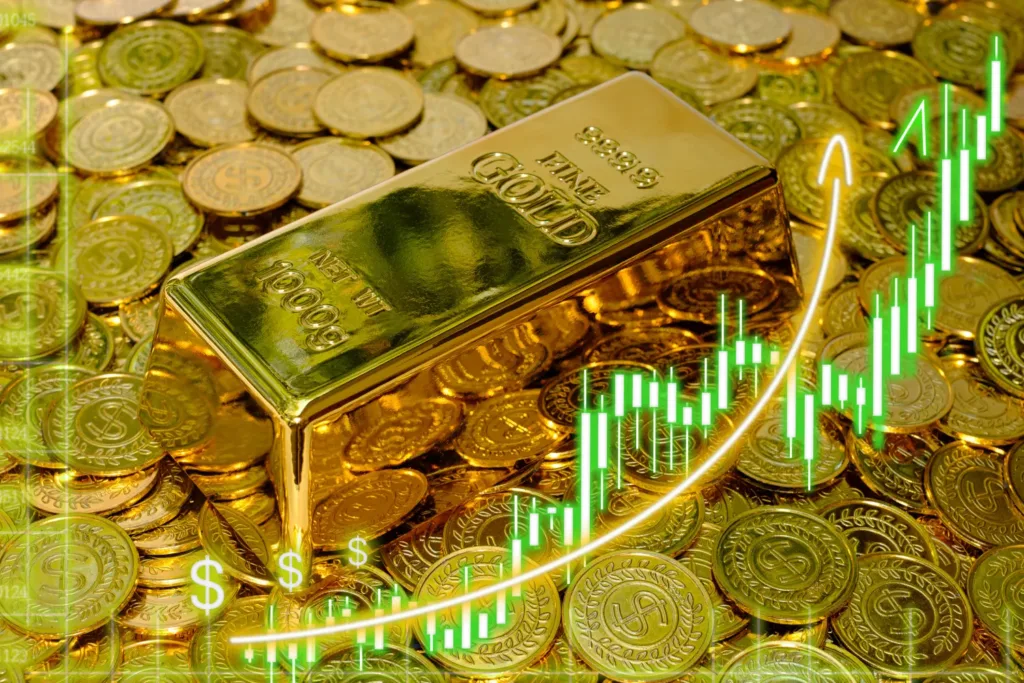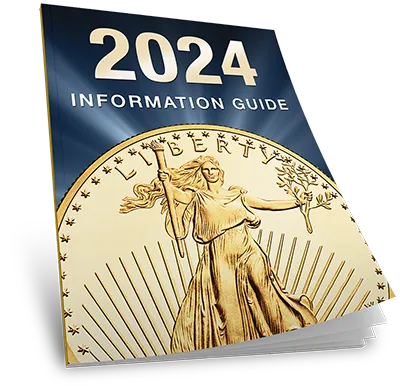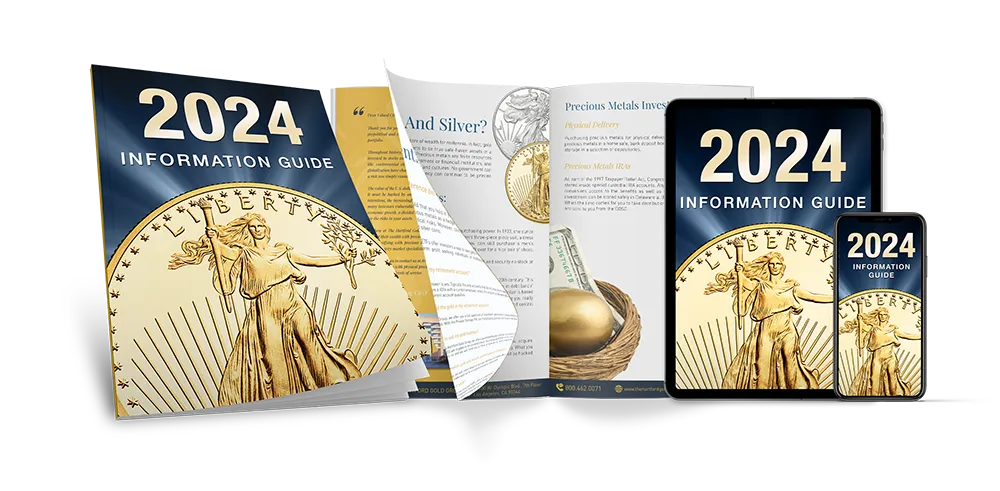Gold prices and inflation are closely linked, with gold often considered a hedge against the eroding power of inflation. As central banks like the Federal Reserve navigate interest rates and monetary policy, the price of gold reacts, serving as a barometer for the financial markets’ response to inflationary trends.
Let’s explore how inflation impacts the value of gold. We’ll look at the role of gold as a safe-haven asset during times of high inflation and economic uncertainty and how it might preserve purchasing power when inflation rises.
What Is Inflation?
Inflation is the rate at which the general level of prices for goods and services is rising, and consequently, the purchasing power of currency is falling. Central banks, such as the Federal Reserve in the United States, closely monitor the inflation rate, which is a primary indicator of the economy’s health.
Consumer Price Index (CPI)
The Consumer Price Index (CPI) is one of the most closely watched inflation indicators. It measures the average change over time in the prices paid by urban consumers for a market basket of consumer goods and services.
Inflation indicates how expensive goods and services have become over a certain period, usually a year. When inflation rises, each currency unit buys fewer goods and services, which can erode the purchasing power of money. This is crucial for consumers whose real income can be eroded by inflation unless their nominal earnings increase at a similar or higher rate.
Influencers of Inflation
Inflation is influenced by various factors, including the supply of money, demand for goods versus their supply, and the cost of labor and materials. The Federal Reserve, or the “Fed,” can influence inflation by adjusting the interest rates — lower rates tend to stimulate borrowing and spending, increasing inflation. In comparison, higher rates may slow down the economy and reduce inflation.
Inflationary pressures are a natural part of growing economies but can be problematic when they become too strong or weak. High inflation, or hyperinflation, can lead to a rapid loss of confidence in a currency, while deflation can lead to a decrease in consumer spending, which may cause economic stagnation.
Gold as an Asset
Physical gold is often viewed as an inflation hedge because its price tends to go up when the cost of living increases. During periods of high inflation, gold prices may rise as people look for safe-haven assets that hold their value better than inflation-affected currencies. Gold has historically maintained its value over the long term despite the volatility in the price of gold in the short to medium term.
You might buy gold directly in the form of gold bars. Central banks sometimes hold gold reserves as a part of their monetary policy strategy, providing a foundational asset supporting their currencies’ value.
Inflation reflects the rate at which the general price level of goods and services rises, and understanding it is important for consumers. Gold’s historical role as an inflation hedge makes it essential to the conversation when discussing inflation’s impact on financial markets and asset classes.
What Contributes to Inflation?
There are a variety of factors that may contribute to inflation. Here are some of the main contributors:
Demand-Pull Inflation: When the demand for goods and services exceeds their supply, demand-pull inflation often happens in a rapidly growing economy. Prices go up when more people want to buy goods than those available.
Cost-Push Inflation: If the cost of production goes up, producers may pass on the increased costs to consumers. This can be due to rising labor costs, more expensive raw materials, or higher taxes.
Monetary Policy: Central banks, like the Federal Reserve, control the money supply through monetary policy. If a central bank creates too much money, it can decrease the currency’s value and lead to inflation. Conversely, tightening the money supply too much can lead to deflation.
Fiscal Policy: Government spending and taxation also impact inflation. Without equivalent taxation, high levels of government spending can increase the money supply and demand, potentially leading to inflation.
Exchange Rates: If the value of a country’s currency falls compared to other currencies, referred to as devaluation, the cost of imported goods will rise, which has an impact on inflation.
Wage-Price Spiral: If wages increase, businesses may raise prices to maintain their profit margins, leading to a cycle of rising wages and prices.
Supply Chain Disruptions: Issues in the supply chain can lead to shortages of goods, pushing up prices due to limited availability.
Economic Policies and Regulations: Changes in economic policies and regulations can affect production costs and business operations, potentially leading to inflation.
Global Events: Events like pandemics, wars, or natural disasters can disrupt production and supply chains, leading to shortages and increased prices.
Expectations of Inflation: If businesses and consumers expect higher inflation, they may adjust their behavior to contribute to inflation by demanding higher wages or increasing prices preemptively.
What Is the History of Gold Prices?
Gold prices have been high value for a long time, used most often for money and jewelry. Even though it has fluctuated, its price has been stable for centuries. This changed in the 1900s when countries started to use the Gold Standard, linking their money’s value to gold. The system worked until after World War II when nations decided to use the U.S. dollar as their primary currency, which remained connected to gold.
In 1971, the U.S. stopped allowing the dollar to be turned into gold. This change affected gold prices based on what people would pay. The price went up and down for many years due to how the U.S. economy was doing, inflation, and significant world events.
In the 2000s, when the internet bubble burst, and again when the financial crisis hit in 2008, consumers started buying more gold as they worried about the economy. The price became even higher during the COVID-19 pandemic — people saw gold as a safe place to put their money during tough times.
Today, gold’s price moves with inflation, the dollar’s strength, and what the U.S. central bank is doing with interest rates. It’s still an excellent way to keep your money safe when uncertain.
How Does Inflation Impact Gold Prices?
Consumers often buy gold when worried about inflation — gold can keep its value better than money in the bank. Here’s how inflation can affect the price of gold:
Gold Demand
When gold is in demand, the price usually goes up. During times when people see prices rising quickly — or high inflation — gold collectors are likely to acquire more. As the value of the dollar decreases, gold remains a valuable asset.
Gold Supply
Gold supply may be limited. The price could increase if miners can’t dig up gold fast enough to meet the demand. If it costs more to pull gold out of the ground because of inflation, the price of gold can skyrocket.
Interest Rates
Interest rates equate to the cost of borrowing money. When bodies like the Federal Reserve raise interest rates, it’s often to slow down inflation. Higher interest rates can mean consumers earn more from saving their money, which might make gold less attractive since it doesn’t pay you interest. If people still think that inflation will continue, they might stick with buying gold anyway.
When inflation is high, people often turn to gold as a safe place for their money, which can drive up the price of gold. But if interest rates increase significantly, some people might decide to save money instead if they think it’ll earn them more over time.
Can Gold Serve as a Hedge Against Inflation?
Yes, gold can serve as a good hedge against inflation. Here’s how it works:
Value Over Time: Even when inflation makes money worth less, gold often keeps its value. Over the long term, the price of gold increases as the cost of living increases, which may protect your money’s buying power.
Central Banks and Gold: Banks like the Federal Reserve keep gold as a safety net. If central banks think money’s value will decrease, they may purchase more gold to maintain stability.
Gold vs. Interest Rates: Even though higher interest rates can lead to earning more money from savings, if inflation is anticipated, consumers might choose gold instead. Gold doesn’t pay you interest, but it can still be an ideal choice if it’s keeping up with inflation.
In short, gold is like a financial anchor — it can help stop your wealth from dwindling when inflation hits. Its price can swing, but history shows that gold often holds up better against inflation.
What Makes Gold a Good Purchase?
Gold is generally a smart purchase as it’s known for holding value, especially when the cost of living increases. People often flock to gold during economic ups and downs because gold is considered a safe-haven asset — it’s less volatile than stocks, which can swing up and down a lot.
Having a precious metal like gold adds diversity to your assets. It is physical real estate you can hold, unlike stocks or bonds, making it more tangible.
Big players in finance, like central banks and Wall Street, stock up on gold as well — gold can protect your wealth if the value of your currency goes down. Since gold is valued globally, it’s less affected by problems in any country’s economy.
The versatility and historical dependability of the gold market make it a good purchase for many investors looking for stability and a hedge against economic uncertainties.
The Bottom Line
Past performance has shown that gold has stood the test of time as a valuable asset, offering security when inflation hits hard. It demonstrates the peace of mind of knowing you have a hedge against inflation and economic volatility.
American Hartford Gold understands this, so we offer consumers an avenue for purchasing these precious metals. Acquiring gold through a trusted partner can help preserve your wealth, offering a solid foundation in both buoyant and turbulent times.
Sources:
Inflation: What It Is, How It Can Be Controlled, and Extreme Examples | Investopedia
What Are the Major Causes of Inflation? | The Balance Money
Gold Spot Prices & Market History | World Gold Council
Gold Price and Its Relationship with Inflation | Inflation Data






